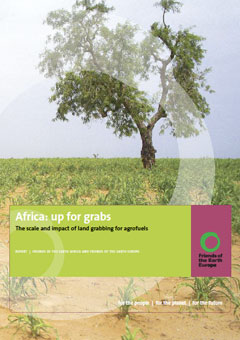The European Union’s renewable fuels target is driving land grabs in Africa that threaten the environment and local communities, claims a new report from Friends of the Earth (FOE).
Africa: up for grabs – The scale and impact of land grabbing for agrofuels [PDF] reviews a series of land deals signed across more than a dozen countries in recent years. It finds that private European companies are active participants in the deals, which sometimes are made without environmental impact assessments or consent from local communities.
“Growing European and international demand for agrofuels as a transport fuel is creating market demand for agrofuels,” the report states. “While African politicians may promise that agrofuels will bring locally sourced energy supplies to their countries, the reality is that most of the foreign companies are developing agrofuels to sell on the international market. The EU’s mandatory target for increasing agrofuels is a clear driver to the land grabbing in Africa.”
The report warns that the land deals could increase food prices and exacerbate food scarcity in countries already suffering from food insecurity.
 Africa: up for grabs – The scale and impact of land grabbing for agrofuels |
“The competition for land and the competition for staple food crops such as cassava and sweet sorghum for agrofuels is likely to push up food and land prices,” says the report. “This competition for agricultural land raises fundamental questions about food sovereignty and government priorities.
Should a country that is dependent on food aid (such as Kenya or Ethiopia) be selling fertile land to developers to grow fuel?”
In light of these concerns, FOE urges the E.U. to dump its biofuels target, which aims to reduce greenhouse gas emissions by mandating that 20 percent of liquid transport fuels come from “renewable” sources by 2020. The environmental group calls on African governments to “immediately suspend further land acquisitions and investments in agrofuels” and implement safeguards —including mandated environmental impact assessments and legally-binding and
enforceable obligations on investors — to protect communities from exploitation.
Africa: up for grabs – The scale and impact of land grabbing for agrofuels
Related articles
EU mandates biofuel environmental standards to protect forests, wetlands
(06/10/2010) The E.U. today moved to establish environmental standards for biofuels used in Europe, requiring biofuels to deliver “substantial reductions” in greenhouse gas emissions and not result in conversion of forests or wetlands, according to a statement from the European Commission.
EU biofuels target will starve the poor, says anti-poverty group
(02/16/2010) The European Union’s biofuel targets could starve up to 100 million people, warns a report from an anti-poverty charity. ActionAid estimates the E.U.’s plan to source 10 percent of transport fuels from biofuels would increase competition for agricultural lands, spurring a sharp rise in food prices. Dearer food would disproportionally affect the world’s poorest people.
Consumers should help pay the bill for ‘greener’ palm oil

(01/12/2010) Palm oil is one of the world’s most traded and versatile agricultural commodities. It can be used as edible vegetable oil, industrial lubricant, raw material in cosmetic and skincare products and feedstock for biofuel production. Growing global demand for palm oil and the ensuing cropland expansion has been blamed for a wide range of environmental ills, including tropical deforestation, peatland degradation, biodiversity loss and CO2 emissions. In response to these concerns, a group of stakeholders—including activists, investors, producers and retailers—formed the Roundtable on Sustainable Palm Oil (RSPO) to develop a certification scheme for palm oil produced through environmentally- and socially-responsible ways. It is widely anticipated that the creation of a premium market for RSPO-certified sustainable palm oil (CSPO) would incentivize palm oil producers to improve their management practices.
EU biofuels policy undermines governance in Indonesia, alleges report

(09/21/2009) Indonesian authorities are failing to prevent illegal logging and conversion of protected areas for oil palm cultivation used to supply the European market with supposedly “green” biofuels, alleges a new report from Milieudefensie (Friends of the Earth Netherlands) and WALHI KalBar (Friends of the Earth Indonesia, West Kalimantan). The report, “Failing governance – Avoiding responsibilities”, claims that European biofuel policies have driven reckless oil palm expansion in Ketapang District, West Kalimantan, resulting in illegal issuance of development permits and land conflicts, thereby undermining governance structures.
US subsidies of oil and coal more than double the subsidies of renewable energy
(09/21/2009) During the fiscal years of 2002-2008 the United States handed out subsidies to fossil fuel industries to a tune of 72 billion dollars, while renewable energy subsidies, during the same period, reached 29 billion dollars.